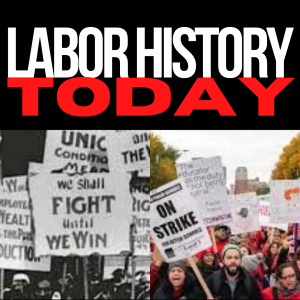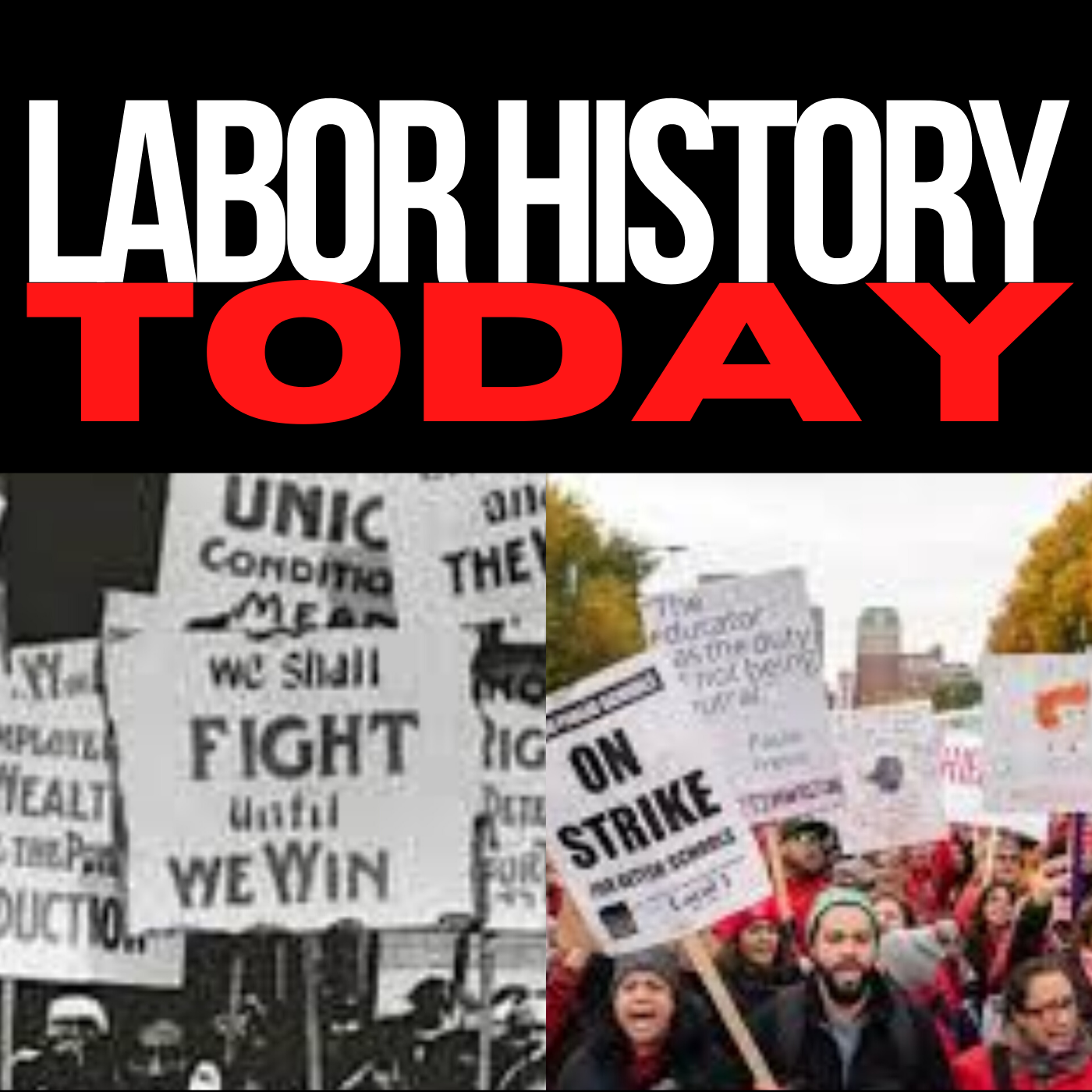Episodes
Episodes



Sunday Jan 31, 2021
What’s the matter with labor history?
Sunday Jan 31, 2021
Sunday Jan 31, 2021
Conor Casey, Labor Archivist at the University of Washington Labor Archives, talks about the life and work of Anna Louise Strong, a 20th-century American journalist, activist, and supporter of the labor movement with Mike Dumovich on the We Do The Work radio show. Steelworker Mike Stout, author of The Homestead Steel Mill: The Final 10 Years, takes a deep dive into the history of unions and their struggles at the mill on a recent edition of the Heartland Labor Forum radio show.Why don't people know U.S. labor history? When we do know labor history, we tend to romanticize it and oversimplify it. Where did labor go wrong and what can we learn from the past? Historian Max Krochmal unpacks these questions in a wide-ranging discussion with Gene Lantz on the Workers Beat radio show. And, on Labor History in 2:00, Rick Smith tells us about the day New Orleans Fired 7,000 Teachers. Music: Nothing Moves But The Tide by The Fuse, courtesy of the University of Washington's Seattle General Strike Project.Produced by Chris Garlock, edited by Patrick Dixon. To contribute a labor history item, email laborhistorytoday@gmail.com
Labor History Today is produced by the Metro Washington Council’s Union City Radio and the Kalmanovitz Initiative for Labor and the Working Poor at Georgetown University. We're a proud founding member of the Labor Radio Podcast Network, more than 80 shows focusing on working people’s issues and concerns. #LaborRadioPod



Sunday Jan 24, 2021
The People, No
Sunday Jan 24, 2021
Sunday Jan 24, 2021
Kansas City native Thomas Frank talks with the Heartland Labor Forum radio show about his new book about American populism, the long trail of elites who hate it, why pundits called Donald Trump a populist and why he’s nothing of the kind.
Harvey J. Kaye on The Fight for The Four Freedoms: What Made FDR and The Greatest Generation Truly Great, in an excerpt from Empathy Media Lab.
And on Labor History in 2:00, Rick Smith tells us about Arturo Alfonso Schomburg.
Today’s music includes two songs from the great MrBettsClass videos, Populist Party – a parody of Taylor Swift's "Style" – and New Deal – a parody of Bruno Mars "Uptown Funk."
Produced and edited by Chris Garlock. To contribute a labor history item, email laborhistorytoday@gmail.com
Labor History Today is produced by the Metro Washington Council’s Union City Radio and the Kalmanovitz Initiative for Labor and the Working Poor at Georgetown University. We're a proud founding member of the Labor Radio Podcast Network, more than 80 shows focusing on working people’s issues and concerns. #LaborRadioPod



Sunday Jan 17, 2021
Stand! The new hit labor musical
Sunday Jan 17, 2021
Sunday Jan 17, 2021
The new film Stand! -- described as Norma Rae meets Hamilton – is set during the 1919 general strike in Winnipeg, Canada, and features an immigrant Romeo and Juliet battling for love and a better life during a time of social upheaval not unlike our own.Producer and composer Danny Schur talks about it with the New York State AFL-CIO’s podcast Union Strong. Catch a free screening of Stand! by the DC Labor FilmFest this Tuesday night, January 19, 7p EST, when Labor History Today host Chris Garlock will be doing a live Q&A after the film with Danny Schur, director Robert Adetuyi and actor Gregg Henry. RSVP here. In Part 2 of her online talk Skyscraper Labor and the Places of Labor Protest for The Skyscraper Museum last November, architectural historian Joanna Merwood-Salisbury turns to Union Square in New York City and the movement to improve working conditions for garment industry workers in New York’s commercial lofts in the early twentieth century. And on Labor History in 2:00, Rick Smith tells us about Standing Against Wage Theft more than a century ago.Today’s music includes the title track of the musical Stand! sung by Lisa Bell. Produced and edited by Chris Garlock. To contribute a labor history item, email laborhistorytoday@gmail.com
Labor History Today is produced by the Metro Washington Council’s Union City Radio and the Kalmanovitz Initiative for Labor and the Working Poor at Georgetown University. We're a proud founding member of the Labor Radio Podcast Network, more than 60 shows focusing on working people’s issues and concerns. #LaborRadioPodYou’ll find more Labor History in 2:00 here.



Sunday Jan 10, 2021
The Vancouver Island Coal Strike; Skyscraper Labor
Sunday Jan 10, 2021
Sunday Jan 10, 2021
This week, the story of the 1912 Vancouver Island Coal Strike -- the most protracted, violent and hard-fought strike in British Columbia's long labour history -- from the On The Line podcast. In Part 1 of her online talk for The Skyscraper Museum last November, architectural historian Joanna Merwood-Salisbury traces labor protests in the construction industry in Chicago in the 1880s and examines the formation of unions uniting trades-based groups with ethnic organizations, as well as the public spaces of their protest movements.And on Labor History in 2:00, Rick Smith tells us about The Rise of Settlement Houses. Today’s music includes My Song for the Miner, by Fred White, from a great video by filmmaker Junie Boudreau, dedicated to Canadian miners from Cape Breton, Nova Scotia and across Canada. Plus, Which Side Are You On, by George Mann. Produced by Chris Garlock; edited by Patrick Dixon. To contribute a labor history item, email laborhistorytoday@gmail.com
Labor History Today is produced by the Metro Washington Council’s Union City Radio and the Kalmanovitz Initiative for Labor and the Working Poor at Georgetown University. We're a proud founding member of the Labor Radio Podcast Network, more than 60 shows focusing on working people’s issues and concerns. #LaborRadioPodYou’ll find more Labor History in 2:00 here.



Sunday Jan 03, 2021
Cutting along the Color Line
Sunday Jan 03, 2021
Sunday Jan 03, 2021
Happy New Year from the LHT team! 2020 was certainly a historic year, and here on the Labor History Today podcast the past and present kept colliding in interesting and unusual ways. Back in August, Quincy Mills, Professor of History at the University of Maryland in College Park talked with us about black barbers, the evolution of their trade, and its political meaning as a skilled form of labor.The show also featured poet Martin Espada reading his poem "Castles for the Laborers and Ballgames on the Radio," written for his friend, historian Howard Zinn. Here’s our show from August 30, 2020, updated with today’s Labor History in 2, "The Power of Folded Arms and Marching Feet."
Produced by Chris Garlock; edited by Patrick Dixon. To contribute a labor history item, email laborhistorytoday@gmail.com
Labor History Today is produced by the Metro Washington Council’s Union City Radio and the Kalmanovitz Initiative for Labor and the Working Poor at Georgetown University. We're a proud founding member of the Labor Radio Podcast Network, more than 60 shows focusing on working people’s issues and concerns. #LaborRadioPod



Sunday Dec 27, 2020
Cordwainers strike of 1805
Sunday Dec 27, 2020
Sunday Dec 27, 2020
One of the earliest strikes in the first years of the first industrial revolution in America.Shoemaking was one of the most lucrative trades in Philadelphia during the eighteenth and early nineteenth centuries. Shoemakers – known as cordwainers at the time -- were among the first to organize into journeyman societies in the United States. In 1805, cordwainers went on strike over wages and their changing workplace. Northampton Community College Professor of History Patrick Grubbs chronicled the Cordwainers strike of 1805 and explained what came of it on America’s Work Force Union Podcast earlier this month. On this week’s Labor History in 2:00, Musicians Fight Back: When it came time to sign union cards, the symphony opposed the election claiming the musicians were independent contractors.We wrap up this week’s show with Barry Rabin’s song about a little-known 1982 strike…Little girls and boys almost didn't get their toys, the year the elves went out on strike. Produced by Chris Garlock, edited by Patrick Dixon. To contribute a labor history item, email laborhistorytoday@gmail.comLabor History Today is produced by the Metro Washington Council’s Union City Radio and the Kalmanovitz Initiative for Labor and the Working Poor at Georgetown University. We're a proud founding member of the Labor Radio Podcast Network, nearly 80 shows focusing on working people’s issues and concerns. #LaborRadioPod @AWFUnionPodcast @GeorgetownKILWP



Sunday Dec 20, 2020
The AFL-CIO turns 65
Sunday Dec 20, 2020
Sunday Dec 20, 2020
As the nation’s labor federation celebrates a significant anniversary, we hear the voices of AFL president George Meany and CIO president Walter Reuther at the 1955 founding convention of the AFL-CIO, and labor historian Joe McCartin looks at the federation’s past, present and future. And, on this week’s Labor History in 2:00, The Union is DISSOLVED! Produced and edited by Chris Garlock. To contribute a labor history item, email laborhistorytoday@gmail.com
Labor History Today is produced by the Metro Washington Council’s Union City Radio and the Kalmanovitz Initiative for Labor and the Working Poor at Georgetown University. We're a proud founding member of the Labor Radio Podcast Network, nearly 80 shows focusing on working people’s issues and concerns. #LaborRadioPod



Sunday Dec 13, 2020
Paul Robeson and the 1948 Library of Congress cafeteria workers’ strike
Sunday Dec 13, 2020
Sunday Dec 13, 2020
With 95% of DC’s hotel and restaurant workers out of work because of the COVID-19 pandemic, we look back at the history of cafeteria workers’ struggle for a union at the Library of Congress and how singer and activist Paul Robeson supported their 1948 strike.
Former AFSCME organizer and DC 37 Executive Director Lillian Roberts tells how a showdown with New York State Governor Nelson Rockefeller over the right of state workers to organize led to her being jailed for two weeks in December, 1968.
The Heartland Labor Forum talks with Mark Bradley, author of Blood Runs Coal, about the brutal 1968 murder of Jock Yablonski and his family by United Mineworkers president Tony Boyle, and how it inspired a surge in union democracy.
And, on this week’s Labor History in 2:00, Rick Smith tells us about The Beginning of the End of Apartheid.
Music: Joe Hill and Old Man River, by Paul Robeson; The Jablonski Murder, by Hazel Dickens.Produced and edited by Chris Garlock. To contribute a labor history item, email laborhistorytoday@gmail.com
Labor History Today is produced by the Metro Washington Council’s Union City Radio and the Kalmanovitz Initiative for Labor and the Working Poor at Georgetown University. We're a proud founding member of the Labor Radio Podcast Network, nearly 80 shows focusing on working people’s issues and concerns. #LaborRadioPod




